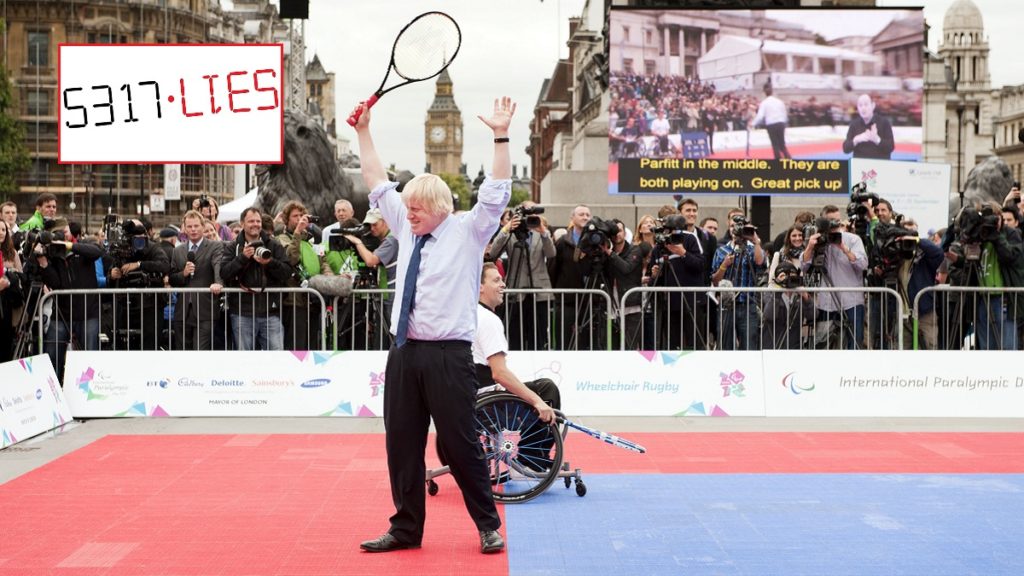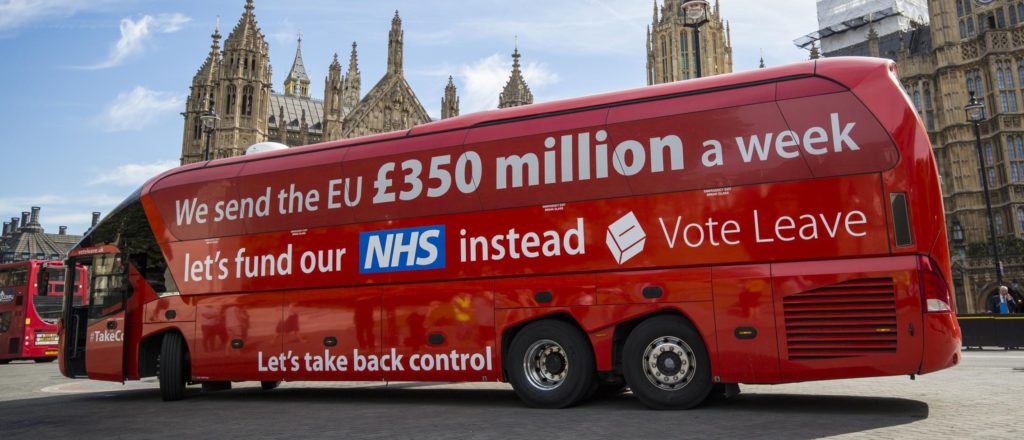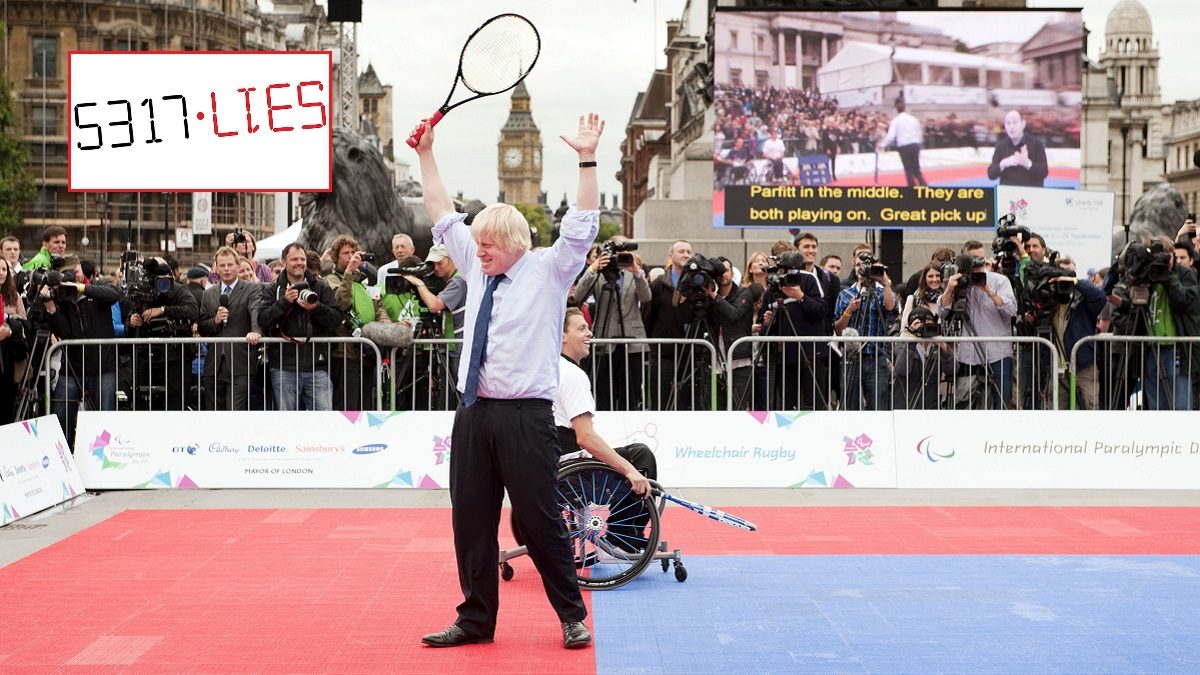
• Part 1: ‘Trade with the EU is declining’ (no, it isn’t)
• Part 3: Why are all polling companies run by Tories?
• Part 4: ‘The UK is the fastest-growing economy in the G7’ (no, it isn’t)
Here’s a thought experiment. Picture a woman who’s two metres tall (about 6ft 6in). Easy, right? Now picture a second woman, standing next to the first, who is a millon times taller: 2 million metres, or 2,000km, tall. I guarantee you the giant you’re imagining is no more than 100 times the size of her neighbour.
Try approaching it another way. Say the six-foot woman launches a rocket, which travels straight upwards at 100mph (about the average speed of the space shuttle for the first minute after take-off). How long do you think you will have to keep mentally following that rocket before it draws level with the giant’s head? The answer is 12 and a half hours.
All of which is a rather long-winded way of showing that human brains are rubbish at processing large quantities. If everyday numbers cause a mental power cut in most of us, big numbers trigger a full-on meltdown.
“The crooks already know these tricks. Honest men must learn them in self-defence”
Darrell Huff, How To Lie With Statistics (1954)
‘We send the EU £350m a week’

No examination of number abuses would be complete without a look at the granddaddy of them all: the slogan that, along with “Take back control”, arguably swung the EU referendum for Leave.
On one level, of course, it was just another example of populists making shit up. The true EU membership fee, after the UK received its rebate, was probably at most half that sum (Vote Leave’s Skid Row Svengali Dominic Cummings admitted in a letter dated April 2016 to Sir Andrew Dilnot of the UK Statistics Authority that “£237m per week was the net level of resources being transferred from the UK as a whole to the EU”) (pdf).
But the arguably more interesting point is why he chose this line of attack in the first place.
The following Twitter exchange from a couple of months ago (I failed to screenshot before the inevitable block came) is enlightening.
“We’ll save £350m a week by leaving the EU!”
“No, we won’t. The figure on the bus was a lie. The true cost of membership is about half that.”
“Well, £175m still
sounds like a lot of money!”
Wait. So £350m a week is too much … and a 50% discount on that is still too much? What’s a reasonable amount then?
This is what Cummings and co were bargaining on. They knew the exact sums involved were immaterial; all that mattered was the emotional impact of the big number. “Eek, seven zeroes!” Critical faculties switched off, job done.
(Meanwhile, the other prong of Cummings’ propaganda assault – Turkey – was designed with similar intent: “Eek, brown people!” Primal fear of The Other evoked, rational brain bypassed, job done.)
Some of us identified the flaw fairly quickly. If I arrived in the pub and told you breathlessly that I’d just spent one thousand pounds, you might raise an eyebrow, but you’d probably reserve your final judgment pending further information. Namely, what did I spend it on? A house, a car, a watch, a hat, or a packet of crisps?
A moment’s reflection, which is apparently more than 52% of the electorate could spare, would tell you that the statement Quantity X costs a lot of money is meaningless in isolation. Before you can judge whether that expenditure is a good idea, you need answers to the following questions:
- Can the buyer afford it? What is this sum as a proportion of their budget?
- What do comparable items or services cost?
- Is it a reasonable rate? Are others being charged a similar amount?
- How much will it cost to get out of the contract?
- What exactly is the buyer getting for their investment? Does it represents good value for money? Can the same or better goods and services be obtained elsewhere, for less outlay?
“They said how much money we would save [by leaving the EU], but they didn’t say how much we would lose”
Rueful Brexit-voting ex-miner from Sunderland, speaking to Financial Times journalist
Let’s tackle those points one by one.
1) The UK’s EU contributions for the financial year to April 2020, minus rebate and EU funds received, came to £7.7bn. Total government spending for the same period is predicted to turn out a shade north of £900bn. So as a proportion of the UK’s overall spending, EU membership cost less than 1%. If you’re a taxpayer earning £30,000 pa, that means you’re paying about £43.53 a year towards the cost of EU membership, or just over a quarter of the TV licence fee. Does £150m a week (£7.7bn/52) feel so enormous now?
2) To put that £7.7bn in perspective, the government spends around £190bn a year on pensions (“We send economically unproductive old people £3.7bn a week. Let’s fund our NHS instead”), £170bn on the NHS, £110bn on education, £43bn on defence, £15bn on civil service pay, £600m on running the House of Commons and the Lords, including £225m on MPs’ and Lords’ salaries and allowances, £67m on the royal family, and £80m on the Department for Exiting the EU. (Specific, up-to-date figures are not available for all these areas, particularly when it comes to the murky warrens of government, so I’m doing some approximating here, but they’re all in the right ballpark.)
To round off with a couple of other large-scale operations, the international aid budget stood at around £15bn a year (until the Tories slashed it), the BBC’s annual spend is around £4bn year, and membership of the United Nations and the World Health Organization sets the country back £100m and £10m a year respectively.
Does £150m a week feel so enormous now?
3) You’ll often hear Brexiters complaining that “the UK is the biggest contributor to the EU”. Again, that’s not true; Germany, France and Italy all pay more. Moreover, there’s a good reason why Britain chips in more than most, which is that Britain is one of the most populous and richest countries in the EU. If you work out the contribution per head, ie, divide the fee between us, the UK is bang in the middle of the field. Norway, which isn’t even a full member of the EU and has no say in passing its laws, pays in more per person than the UK does.
Besides, in most societies, taxation is organised such that richer people pay more than poorer people. It’s hardly crazy to suggest that the same logic should apply to economic blocs.
Does £150m a week feel so enormous now?
4) Calculating the economic cost of extricating Britain from the EU is fiendishly complex, because it touches on so many areas of government, business and personal life, so many of the costs are yet to be borne, and we can’t know for sure how things would have panned out if we’d stayed. But if we’re lacking all the pieces of the jigsaw, we have enough side and corner segments to give us an approximate idea of its size.
The costs come in the form of costs to the government, to businesses and to citizens, but since the government is funded by taxpayers and businesses have little choice but to pass on most costs to customers and employees, they will all, ultimately, be borne by you and me.
(There’s bound to be a bit of double-counting going on here, but I strongly doubt whether that will amount to more than the stuff I’ve missed. Speaking of which, if you’re knowledgeable in this field and you find anything missing or startlingly amiss, please point it out – politely – in the comments, and I will amend ASAP.)
Costs to government
Holding referendum: £130m
Government information campaigns: £50m on Get Ready For Brexit in October 2019; £93m on Get Ready 2: Check, Change, Go, from July 2020
New customs infrastructure to monitor trade: £700m
No-deal Brexit agreement with ferry company that had no ferries: £87m
Paying 27,500 extra civil servants to plan and execute Brexit-related changes: £825m a year (conservatively assuming a salary of £30,000 per civil servant) (plus recruitment costs, benefits, pensions)
Assistance to exporters in training and hiring 50,000 customs officers: £84m
Festival of Brexit: £120m
Extension of Fujitsu contract to service old customs system: £12m
Building 29 lorry parks to hold lorries without correct paperwork: no hard figures yet available because work is ongoing, but the town of Warrington alone received has £800,000 from the government just to help with the costs of running them.
By the end of 2021, the government estimates that it will have spent £8.1bn just on making Brexit happen. And the haemorrhaging of cash isn’t magically going to stop then; businesses will still need support, negotiations for a new trading relationship with the EU will need to continue, and the government will likely have a lot of expensive court cases to fight.
Costs to business
Re-registering all UK-produced chemicals under new licences: £1bn (one-off)
Processing new customs paperwork: £7bn per year (including, I assume, the salaries of the abovementioned customs officers)
Extra admin, traffic delays and lorry parks for haulage and freight firms: £15bn per year
New customs declarations: £17bn-£20bn a year
Costs to you and me
(These will of course vary from person to person, depending on your lifestyles and life choices.)
- Travel visas
- Health insurance
- Mobile roaming charges
- Credit card charges abroad
- Kennelling fees, as pet passporting now defunct
- Higher prices abroad due to lower value of sterling
- Fall in value of pensions due to lower value of sterling
- Rise in prices of imported food and other goods due to lower value of sterling
- Reduction in portion sizes (loss of value)
Plus, of course, the loss of our freedom to live, study, work and retire in 31 countries, which to my mind is incalculable.
Finally, falling upon the nation as a whole is a hotchpotch of unknown and unquantifiable losses, which while impossible to nail down exactly, will without doubt all be sizeable negatives: the talented immigrants put off from coming to the UK; shortages of labour, skilled and unskilled; the brain drain of EU citizens and disillusioned Remainers leaving because of Brexit; the effect on the mental health of millions; the dire consequences for the economy of having a fanatical, incompetent, mendacious, anti-intellectual far-right government in charge; the social costs of a divided and disinformed citizenry; all the governmental, parliamentary and civil service time wasted on Brexit; the value of EU laws on workers’ rights, the environment, and health and safety; the huge blow to Britain’s global reputation and soft power.
All these factors feed into probably the best indicator of a country’s material wealth: its gross domestic product (GDP). When a country is spending so much time and energy on negotiations, and unnecessary infrastructure, and form-filling, and stuck in queues of lorries, it has less time and energy to make things. Meanwhile, tariffs and non-tariff barriers never fail to reduce the volume of trade.
Estimates of the long-term hit to the UK’s GDP vary from 2% to 9%, with only Patrick Minford’s discredited Economists for Europe group predicting any improvement, and that at the cost of the UK’s manufacturing industries. Two per cent of GDP is £42bn per year. Nine per cent is £189bn.
Does £150m a week, or £8bn a year, feel so enormous now?
5) Now to the crunch question. What did the UK get for its money? Even if not everything about the EU was desirable, some of it was clearly worth having, or the UK and every other member state would have quit long ago. Can all these bounties be sourced elsewhere? If so, at what price?
Here’s a list (far from exhaustive – again, please pipe up with any glaring omissions) of some of the basic, and not so basic, functions and programmes provided by the EU.
Frictionless trade, frictionless travel, trade negotiations, Horizon 2020, Natura 2000, Marie Curie programme, EHIC, Erasmus education programme, Erasmus+ sports programme, Galileo, Euratom, European Arrest Warrant, European Medicines Agency, European Banking Agency, European Youth Orchestra, regional development funds, research grants, pet passports …
Some of this is plain irreplaceable. The UK has already given up on developing its own alternative to Galileo, because it has neither the money nor the expertise. Erasmus and Erasmus+ are dead and gone, with only the spectre of a promise of a … UK-only version to succeed it. And if we want to be part of Euratom and the European Arrest Warrant again, we’ll just have to swallow our pride, beg for acceptance, and pay, doubtless over the odds, for the privilege.
Some is replaceable, but under the Tories, highly unlikely to be replaced. The government is going to give Cornwall a measly 5% of the funding it received from the EU, in breach (naturally) of its promise to match the sum in full.
Instead of a plaintive whine of “Lies!”, the Remain campaign’s response to the Bus of Bollocks should have been a bigger bus (Megabus? MAGAbus?) emblazoned with the slogan “£150m a week? Less than 1% of GDP? For all this? Bargain!”, and a word cloud listing all the positives of membership listed above.
Not as catchy, of course, but unfortunately for the good guys, the truth rarely is.
- Next time: I dunno, probably something about surveys and comparing apples and oranges.

